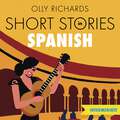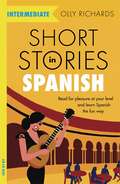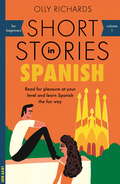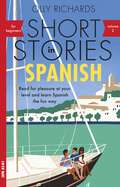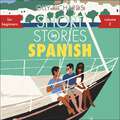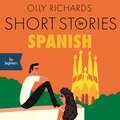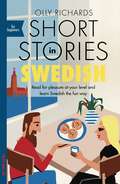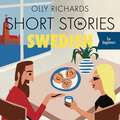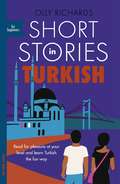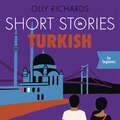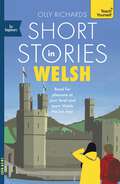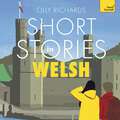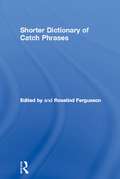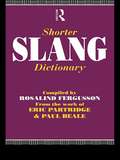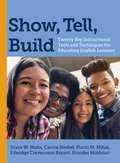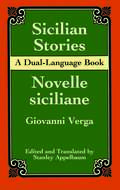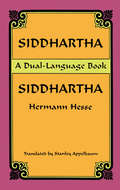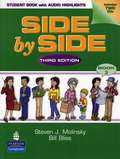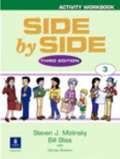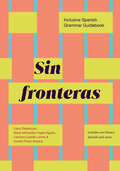- Table View
- List View
Short Stories in Spanish for Intermediate Learners: Read for pleasure at your level, expand your vocabulary and learn Spanish the fun way! (Coffee Break Series)
by Olly RichardsAn unmissable collection of eight unconventional and captivating short stories for young adult and adult intermediate learners of Spanish.Olly's top-notch language-learning insights are right in line with the best of what we know from neuroscience and cognitive psychology about how to learn effectively. I love his work - and you will too! - Barbara Oakley, PhD, Author of New York Times bestseller A Mind for NumbersShort Stories in Spanish for Intermediate Learners has been written specifically for students from a low-intermediate to intermediate level, designed to give a sense of achievement, and most importantly - enjoyment! Mapped to B1- approaching B2 of the Common European Framework of Reference (CEFR), these eight captivating stories will both entertain you and give you a feeling of progress when reading.What does this book give you?· Eight stories in a variety of exciting genres, from science fiction and crime to history and thriller - making reading fun, while you learn a wide range of new vocabulary· Controlled language at your level to help you progress confidently· Realistic spoken dialogues to help you learn conversational expressions and improve your speaking ability· Pleasure! Research shows that if you're enjoying reading in a foreign language, you won't experience the usual feelings of frustration - 'It's too hard!' 'I don't understand!'· Accessible grammar so you learn new structures naturally, in a stress-free wayWith intriguing plots that will spark your imagination and keep you reading, Short Stories in Spanish will take your grasp of Spanish to the next level with key features to support and consolidate your progress, including:· Full plot summary· Comprehension questions after each chapter· A glossary for bolded words in each text· A bilingual word list.As a result, you will be able to focus on enjoying reading, delighting in your improved range of vocabulary and grasp of the language all without ever feeling overwhelmed. From science fiction to fantasy, to crime and thrillers, Short Stories in Spanish for Intermediate Learners uses reading as the perfect tool to not only delight in learning Spanish, but to accelerate your journey towards fluency.(P) 2019 Hodder & Stoughton Ltd
Short Stories in Spanish for Intermediate Learners: Read for pleasure at your level, expand your vocabulary and learn Spanish the fun way! (Foreign Language Graded Reader Series)
by Olly RichardsAn unmissable collection of eight unconventional and captivating short stories for young adult and adult intermediate learners of Italian.Olly's top-notch language-learning insights are right in line with the best of what we know from neuroscience and cognitive psychology about how to learn effectively. I love his work - and you will too! - Barbara Oakley, PhD, Author of New York Times bestseller A Mind for NumbersShort Stories in Italian for Intermediate Learners has been written specifically for students from a low-intermediate to intermediate level, designed to give a sense of achievement, and most importantly - enjoyment! Mapped to B1-B2 of the Common European Framework of Reference, these eight captivating stories will both entertain you, and give you a feeling of progress when reading.What does this book give you?· Eight stories in a variety of exciting genres, from science fiction and crime to history and thriller - making reading fun, while you learn a wide range of new vocabulary· Controlled language at your level to help you progress confidently· Realistic spoken dialogues to help you learn conversational expressions and improve your speaking ability· Beautiful illustrations accompanying each story, to set the scene and support your understanding· Accessible grammar so you learn new structures naturally, in a stress-free way· Pleasure! Research shows that if you're enjoying reading in a foreign language, you won't experience the usual feelings of frustration - 'It's too hard!' 'I don't understand!'With intriguing plots that will spark your imagination and keep you reading, Short Stories in Italian will take your grasp of Italian to the next level with key features to support and consolidate your progress, including:· A glossary for bolded words in each text· A bilingual word list· Full plot summary· Comprehension questions after each chapter. As a result, you will be able to focus on enjoying reading, delighting in your improved range of vocabulary and grasp of the language all without ever feeling overwhelmed. From science fiction to fantasy, to crime and thrillers, Short Stories in Italian for Intermediate Learners uses reading as the perfect tool to not only delight in learning Italian, but to accelerate your journey towards fluency.
Short Stories in Spanish for Beginners (Foreign Language Graded Reader Series)
by Olly RichardsAn unmissable collection of eight unconventional and captivating short stories for young and adult learners."I love Olly's work - and you will too!" - Barbara Oakley, PhD, Author of New York Times bestseller A Mind for NumbersShort Stories in Spanish for Beginners has been written especially for students from beginner to intermediate level, designed to give a sense of achievement, and most importantly - enjoyment! Mapped to A2-B1 on the Common European Framework of Reference, these eight captivating stories will both entertain you, and give you a feeling of progress when reading.What does this book give you?· Eight stories in a variety of exciting genres, from science fiction and crime to history and thriller - making reading fun, while you learn a wide range of new vocabulary· Controlled language at your level, including the 1000 most frequent words, to help you progress confidently· Authentic spoken dialogues, to help you learn conversational expressions and improve your speaking ability· Pleasure! It's much easier to learn a new language when you're having fun, and research shows that if you're enjoying reading in a foreign language, you won't experience the usual feelings of frustration - 'It's too hard!' 'I don't understand!'· Accessible grammar so you learn new structures naturally, in a stress-free wayCarefully curated to make learning a new language easy, these stories include key features that will support and consolidate your progress, including· A glossary for bolded words in each text· A bilingual word list· Full plot summary· Comprehension questions after each chapter. As a result, you will be able to focus on enjoying reading, delighting in your improved range of vocabulary and grasp of the language, without ever feeling overwhelmed or frustrated. From science fiction to fantasy, to crime and thrillers, Short Stories in Spanish for Beginners will make learning Spanish easy and enjoyable.
Short Stories in Spanish for Beginners, Volume 2: Read for pleasure at your level, expand your vocabulary and learn Spanish the fun way with Teach Yourself Graded Readers (Teach Yourself Foreign Language Graded Reader Series)
by Olly RichardsAn unmissable collection of eight unconventional and captivating short stories for young adult and adult learners of Spanish.Olly's top-notch language-learning insights are right in line with the best of what we know from neuroscience and cognitive psychology about how to learn effectively. I love his work - and you will too! - Barbara Oakley, PhD, Author of New York Times bestseller A Mind for NumbersShort Stories in Spanish for Beginners, Volume 2 has been written specifically for students from a high-beginner to intermediate level, designed to give a sense of achievement, and most importantly - enjoyment! Mapped to A2-B2 of the Common European Framework of Reference, these eight captivating stories will both entertain you, and give you a feeling of progress when reading.What does this book give you?· Eight stories in a variety of exciting genres, from science fiction and crime to history and thriller - making reading fun, while you learn a wide range of new vocabulary· Controlled language at your level to help you progress confidently· Realistic spoken dialogues to help you learn conversational expressions and improve your speaking ability· Beautiful illustrations accompanying each story, to set the scene and support your understanding· Accessible grammar so you learn new structures naturally, in a stress-free way· Pleasure! Research shows that if you're enjoying reading in a foreign language, you won't experience the usual feelings of frustration - 'It's too hard!' 'I don't understand!'With intriguing plots that will spark your imagination and keep you reading, Short Stories in Spanish for Beginners, Volume 2 will take your grasp of Spanish to the next level with key features to support and consolidate your progress, including:· A glossary for bolded words in each text· A bilingual word list· Full plot summary· Comprehension questions after each chapter. As a result, you will be able to focus on enjoying reading, delighting in your improved range of vocabulary and grasp of the language all without ever feeling overwhelmed. From science fiction to fantasy, to crime and thrillers, Short Stories in Spanish for Beginners, Volume 2 uses reading as the perfect tool to not only delight in learning Italian, but to accelerate your journey towards fluency.
Short Stories in Spanish for Beginners, Volume 2: Read for pleasure at your level, expand your vocabulary and learn Spanish the fun way with Teach Yourself Graded Readers (Teach Yourself Foreign Language Graded Reader Series)
by Olly RichardsAn unmissable collection of eight unconventional and captivating short stories for young adult and adult learners of Spanish.Olly's top-notch language-learning insights are right in line with the best of what we know from neuroscience and cognitive psychology about how to learn effectively. I love his work - and you will too! - Barbara Oakley, PhD, Author of New York Times bestseller A Mind for NumbersShort Stories in Spanish for Beginners, Volume 2 has been written specifically for students from a high-beginner to intermediate level, designed to give a sense of achievement, and most importantly - enjoyment! Mapped to A2-B2 of the Common European Framework of Reference, these eight captivating stories will both entertain you, and give you a feeling of progress when reading.What does this book give you?· Eight stories in a variety of exciting genres, from science fiction and crime to history and thriller - making reading fun, while you learn a wide range of new vocabulary· Controlled language at your level to help you progress confidently· Realistic spoken dialogues to help you learn conversational expressions and improve your speaking ability· Beautiful illustrations accompanying each story, to set the scene and support your understanding· Accessible grammar so you learn new structures naturally, in a stress-free way· Pleasure! Research shows that if you're enjoying reading in a foreign language, you won't experience the usual feelings of frustration - 'It's too hard!' 'I don't understand!'With intriguing plots that will spark your imagination and keep you reading, Short Stories in Spanish for Beginners, Volume 2 will take your grasp of Spanish to the next level with key features to support and consolidate your progress, including:· A glossary for bolded words in each text· A bilingual word list· Full plot summary· Comprehension questions after each chapter. As a result, you will be able to focus on enjoying reading, delighting in your improved range of vocabulary and grasp of the language all without ever feeling overwhelmed. From science fiction to fantasy, to crime and thrillers, Short Stories in Spanish for Beginners, Volume 2 uses reading as the perfect tool to not only delight in learning Italian, but to accelerate your journey towards fluency.
Short Stories in Spanish for Beginners, Volume 2: Read for pleasure at your level, expand your vocabulary and learn Spanish the fun way with Teach Yourself Graded Readers (Teach Yourself Foreign Language Graded Reader Series)
by Olly RichardsAn unmissable collection of eight unconventional and captivating short stories for young adult and adult learners of Spanish.Olly's top-notch language-learning insights are right in line with the best of what we know from neuroscience and cognitive psychology about how to learn effectively. I love his work - and you will too! - Barbara Oakley, PhD, Author of New York Times bestseller A Mind for Numbers Short Stories in Spanish for Beginners, Volume 2 has been written specifically for students from a high-beginner to intermediate level, designed to give a sense of achievement, and most importantly - enjoyment! Mapped to A2-B2 of the Common European Framework of Reference, these eight captivating stories will both entertain you, and give you a feeling of progress when listening. What does this audiobook give you? · Eight stories in a variety of exciting genres, from science fiction and crime to history and thriller - making listening fun, while you learn a wide range of new vocabulary · Controlled language at your level to help you progress confidently · Realistic spoken dialogues to help you learn conversational expressions and improve your speaking ability · Accessible grammar so you learn new structures naturally, in a stress-free way · Pleasure! Research shows that if you're enjoying reading in a foreign language, you won't experience the usual feelings of frustration - 'It's too hard!' 'I don't understand!' With intriguing plots that will spark your imagination and keep you listening, Short Stories in Spanish for Beginners, Volume 2 will take your grasp of Spanish to the next level with key features to support and consolidate your progress. As a result, you will be able to focus on enjoying reading, delighting in your improved range of vocabulary and grasp of the language all without ever feeling overwhelmed. From science fiction to fantasy, to crime and thrillers, Short Stories in Spanish for Beginners, Volume 2 uses listening as the perfect tool to not only delight in learning Spanish, but to accelerate your journey towards fluency.
Short Stories in Spanish for Beginners: Read for pleasure at your level, expand your vocabulary and learn Spanish the fun way! (Foreign Language Graded Reader Ser.)
by Olly RichardsAn unmissable collection of eight unconventional and captivating short stories for young and adult learners."I love Olly's work - and you will too!" - Barbara Oakley, PhD, Author of New York Times bestseller A Mind for NumbersShort Stories in Spanish for Beginners has been written especially for students from beginner to intermediate level, designed to give a sense of achievement, and most importantly - enjoyment! Mapped to A2-B1 on the Common European Framework of Reference, these eight captivating stories will both entertain you, and give you a feeling of progress when reading.What does this book give you?· Eight stories in a variety of exciting genres, from science fiction and crime to history and thriller - making reading fun, while you learn a wide range of new vocabulary· Controlled language at your level, including the 1000 most frequent words, to help you progress confidently· Authentic spoken dialogues, to help you learn conversational expressions and improve your speaking ability· Pleasure! It's much easier to learn a new language when you're having fun, and research shows that if you're enjoying reading in a foreign language, you won't experience the usual feelings of frustration - 'It's too hard!' 'I don't understand!'· Accessible grammar so you learn new structures naturally, in a stress-free wayCarefully curated to make learning a new language easy, these stories include key features that will support and consolidate your progress, including· A glossary for bolded words in each text· A bilingual word list· Full plot summary· Comprehension questions after each chapter. As a result, you will be able to focus on enjoying reading, delighting in your improved range of vocabulary and grasp of the language, without ever feeling overwhelmed or frustrated. From science fiction to fantasy, to crime and thrillers, Short Stories in Spanish for Beginners will make learning Spanish easy and enjoyable.
Short Stories in Spanish for Beginners: Read for pleasure at your level, expand your vocabulary and learn Spanish the fun way! (Foreign Language Graded Reader Series)
by Olly RichardsAn unmissable collection of eight unconventional and captivating short stories for young and adult learners."I love Olly's work - and you will too!" - Barbara Oakley, PhD, Author of New York Times bestseller A Mind for NumbersShort Stories in Spanish for Beginners has been written especially for students from beginner to intermediate level, designed to give a sense of achievement, and most importantly - enjoyment! Mapped to A2-B1 on the Common European Framework of Reference, these eight captivating stories will both entertain you, and give you a feeling of progress when listening.What does this book give you?· Eight stories in a variety of exciting genres, from science fiction and crime to history and thriller - making learning fun, while you gain a wide range of new vocabulary· Controlled language at your level, including the 1000 most frequent words, to help you progress confidently· Authentic spoken dialogues, to help you learn conversational expressions and improve your speaking ability· Pleasure! It's much easier to learn a new language when you're having fun, and research shows that if you're enjoying listening in a foreign language, you won't experience the usual feelings of frustration - 'It's too hard!' 'I don't understand!'· Accessible grammar so you learn new structures naturally, in a stress-free wayCarefully curated to make learning a new language easy, these stories will entertain you, while at the same time allowing you to benefit from an improved range of vocabulary and a better grasp of the language, without ever feeling overwhelmed or frustrated. From science fiction to fantasy, to crime and thrillers, Short Stories in Spanish for Beginners will make learning Spanish easy and enjoyable.
Short Stories in Swedish for Beginners: Read for pleasure at your level, expand your vocabulary and learn Swedish the fun way!
by Olly RichardsAn unmissable collection of eight unconventional and captivating short stories for young and adult learners of Swedish."Olly's top-notch language-learning insights are right in line with the best of what we know from neuroscience and cognitive psychology about how to learn effectively. I love his work - and you will too!" - Barbara Oakley, PhD, Author of New York Times bestseller A Mind for NumbersShort Stories in Swedish for Beginners has been written especially for students from high-beginner to low-intermediate level, designed to give a sense of achievement, a feeling of progress and most importantly - enjoyment! Mapped to A1-B1 on the Common European Framework of Reference (CEFR) for languages, these eight captivating stories are designed to give you a sense of achievement and a feeling of progress when reading.What does this book give you?- Eight stories in a variety of exciting genres, from science fiction and crime to history and thriller - making reading fun, while you learn a wide range of new vocabulary- Controlled language at your level to help you progress confidently- Realistic spoken dialogues to help you learn conversational expressions and improve your speaking ability- Accessible grammar so you learn new structures naturally, in a stress-free way- Pleasure! Research shows that if you're enjoying reading in a foreign language, you won't experience the usual feelings of frustration - 'It's too hard!' 'I don't understand!'Carefully curated to make learning a new language easy, these stories include key features that will support and consolidate your progress, including: - A glossary for bolded words in each chapter- Full plot summary- A bilingual word list- Comprehension questions after each chapter. As a result, you will be able to focus on enjoying reading, delighting in your improved range of vocabulary and grasp of the language, without ever feeling overwhelmed. From science fiction to fantasy, to crime and thrillers, Short Stories in Swedish for Beginners will make learning Swedish easy and enjoyable.
Short Stories in Swedish for Beginners: Read for pleasure at your level, expand your vocabulary and learn Swedish the fun way! (Foreign Language Graded Reader Series)
by Olly RichardsAn unmissable collection of eight unconventional and captivating short stories for young and adult learners of Swedish."Olly's top-notch language-learning insights are right in line with the best of what we know from neuroscience and cognitive psychology about how to learn effectively. I love his work - and you will too!" - Barbara Oakley, PhD, Author of New York Times bestseller A Mind for Numbers Short Stories in Swedish for Beginners has been written especially for students from high-beginner to low-intermediate level, designed to give a sense of achievement, a feeling of progress and most importantly - enjoyment! Mapped to A1-B1 on the Common European Framework of Reference (CEFR) for languages, these eight captivating stories are designed to give you a sense of achievement and a feeling of progress when reading.What does this book give you?- Eight stories in a variety of exciting genres, from science fiction and crime to history and thriller - making reading fun, while you learn a wide range of new vocabulary- Controlled language at your level to help you progress confidently- Realistic spoken dialogues to help you learn conversational expressions and improve your speaking ability- Accessible grammar so you learn new structures naturally, in a stress-free way- Pleasure! Research shows that if you're enjoying reading in a foreign language, you won't experience the usual feelings of frustration - 'It's too hard!' 'I don't understand!'Carefully curated to make learning a new language easy, these stories include key features that will support and consolidate your progress, including: - A glossary for bolded words in each chapter- Full plot summary- A bilingual word list- Comprehension questions after each chapter. As a result, you will be able to focus on enjoying reading, delighting in your improved range of vocabulary and grasp of the language, without ever feeling overwhelmed. From science fiction to fantasy, to crime and thrillers, Short Stories in Swedish for Beginners will make learning Swedish easy and enjoyable.
Short Stories in Swedish for Beginners: Read for pleasure at your level, expand your vocabulary and learn Swedish the fun way! (Readers)
by Olly RichardsAn unmissable collection of eight unconventional and captivating short stories for young and adult learners of Swedish."Olly's top-notch language-learning insights are right in line with the best of what we know from neuroscience and cognitive psychology about how to learn effectively. I love his work - and you will too!" - Barbara Oakley, PhD, Author of New York Times bestseller A Mind for Numbers Short Stories in Swedish for Beginners has been written especially for students from high-beginner to low-intermediate level, designed to give a sense of achievement, a feeling of progress and most importantly - enjoyment! Mapped to A2-B1 on the Common European Framework of Reference, these eight captivating stories are designed to give you a sense of achievement and a feeling of progress when reading.What does this book give you?- Eight stories in a variety of exciting genres, from science fiction and crime to history and thriller - making reading fun, while you learn a wide range of new vocabulary- Controlled language at your level, including the 1000 most frequent words, to help you progress confidently- Authentic spoken dialogues, to help you learn conversational expressions and improve your speaking ability- Accessible grammar so you learn new structures naturally, in a stress-free way- Pleasure! It's much easier to learn a new language when you're having fun, and research shows that if you're enjoying reading in a foreign language, you won't experience the usual feelings of frustration - 'It's too hard!' 'I don't understand!'Carefully curated to make learning a new language easy, these stories include key features that will support and consolidate your progress, including - A glossary for bolded words in each text - Full plot summary- A bilingual word list- Comprehension questions after each chapter. As a result, you will be able to focus on enjoying reading, delighting in your improved range of vocabulary and grasp of the language, without ever feeling overwhelmed or frustrated. From science fiction to fantasy, to crime and thrillers, Short Stories in Swedish for Beginners will make learning Swedish easy and enjoyable.(P) 2019 Hodder & Stoughton Ltd
Short Stories in Turkish for Beginners: Read for pleasure at your level, expand your vocabulary and learn Turkish the fun way!
by Olly RichardsAn unmissable collection of eight unconventional and captivating short stories for young and adult learners of Turkish."Olly's top-notch language-learning insights are right in line with the best of what we know from neuroscience and cognitive psychology about how to learn effectively. I love his work - and you will too!" - Barbara Oakley, PhD, Author of New York Times bestseller A Mind for NumbersShort Stories in Turkish for Beginners has been written especially for learners from high-beginner to low-intermediate level, designed to give a sense of achievement, and most importantly - enjoyment! Mapped to A2-B1 on the Common European Framework of Reference (CEFR) for languages, these eight captivating stories will both entertain you, and give you a feeling of progress when reading.What does this book give you?· Eight stories in a variety of exciting genres, from science fiction and crime to history and thriller - making reading fun, while you learn a wide range of new vocabulary· Controlled language at your level to help you progress confidently· Realistic spoken dialogues to help you learn conversational expressions and improve your speaking ability· Accessible grammar so you learn new structures naturally, in a stress-free way· Beautiful illustrations accompanying each story, to set the scene and support your understanding· Pleasure! Research shows that if you're enjoying reading in a foreign language, you won't experience the usual feelings of frustration - 'It's too hard!' 'I don't understand!'Carefully curated to make learning a new language easy, these stories include key features that will support and consolidate your progress, including:· A glossary for bolded words in each chapter· A bilingual word list· Full plot summary· Comprehension questions after each chapter. As a result, you will be able to focus on enjoying reading, delighting in your improved range of vocabulary and grasp of the language, without ever feeling overwhelmed. From science fiction to fantasy, to crime and thrillers, Short Stories in Turkish for Beginners will make learning Turkish easy and enjoyable.
Short Stories in Turkish for Beginners: Read for pleasure at your level, expand your vocabulary and learn Turkish the fun way! (Foreign Language Graded Reader Series)
by Olly RichardsAn unmissable collection of eight unconventional and captivating short stories for young and adult learners of Turkish."Olly's top-notch language-learning insights are right in line with the best of what we know from neuroscience and cognitive psychology about how to learn effectively. I love his work - and you will too!" - Barbara Oakley, PhD, Author of New York Times bestseller A Mind for NumbersShort Stories in Turkish for Beginners has been written especially for learners from high-beginner to low-intermediate level, designed to give a sense of achievement, and most importantly - enjoyment! Mapped to A2-B1 on the Common European Framework of Reference (CEFR) for languages, these eight captivating stories will both entertain you, and give you a feeling of progress when reading.What does this book give you?· Eight stories in a variety of exciting genres, from science fiction and crime to history and thriller - making reading fun, while you learn a wide range of new vocabulary· Controlled language at your level to help you progress confidently· Realistic spoken dialogues to help you learn conversational expressions and improve your speaking ability· Accessible grammar so you learn new structures naturally, in a stress-free way· Beautiful illustrations accompanying each story, to set the scene and support your understanding· Pleasure! Research shows that if you're enjoying reading in a foreign language, you won't experience the usual feelings of frustration - 'It's too hard!' 'I don't understand!'Carefully curated to make learning a new language easy, these stories include key features that will support and consolidate your progress, including:· A glossary for bolded words in each chapter· A bilingual word list· Full plot summary· Comprehension questions after each chapter. As a result, you will be able to focus on enjoying reading, delighting in your improved range of vocabulary and grasp of the language, without ever feeling overwhelmed. From science fiction to fantasy, to crime and thrillers, Short Stories in Turkish for Beginners will make learning Turkish easy and enjoyable.
Short Stories in Turkish for Beginners: Read for pleasure at your level, expand your vocabulary and learn Turkish the fun way! (Foreign Language Graded Reader Series)
by Olly RichardsAn unmissable collection of eight unconventional and captivating short stories for young and adult learners of Turkish."Olly's top-notch language-learning insights are right in line with the best of what we know from neuroscience and cognitive psychology about how to learn effectively. I love his work - and you will too!" - Barbara Oakley, PhD, Author of New York Times bestseller A Mind for NumbersShort Stories in Turkish for Beginners has been written especially for students from high-beginner to low-intermediate level, designed to give a sense of achievement, and most importantly - enjoyment! Mapped to A2-B1 on the Common European Framework of Reference (CEFR), these eight captivating stories will both entertain you, and give you a feeling of progress when reading.What does this book give you?· Eight stories in a variety of exciting genres, from science fiction and crime to history and thriller - making reading fun, while you learn a wide range of new vocabulary· Controlled language at your level, including the 1000 most frequent words, to help you progress confidently· Authentic spoken dialogues, to help you learn conversational expressions and improve your speaking ability· Pleasure! It's much easier to learn a new language when you're having fun, and research shows that if you're enjoying reading in a foreign language, you won't experience the usual feelings of frustration - 'It's too hard!' 'I don't understand!'· Accessible grammar so you learn new structures naturally, in a stress-free wayCarefully curated to make learning a new language easy, these stories include key features that will support and consolidate your progress, including· A glossary for bolded words in each text· A bilingual word list· Full plot summary· Comprehension questions after each chapter. As a result, you will be able to focus on enjoying reading, delighting in your improved range of vocabulary and grasp of the language, without ever feeling overwhelmed or frustrated. From science fiction to fantasy, to crime and thrillers, Short Stories in Turkish for Beginners will make learning Turkish easy and enjoyable.(P) 2020 Hodder & Stoughton Ltd
Short Stories in Welsh for Beginners: Read for pleasure at your level, expand your vocabulary and learn Welsh the fun way! (Readers)
by Olly RichardsAn unmissable collection of eight unconventional and captivating short stories for young and adult learners of Swedish."Olly's top-notch language-learning insights are right in line with the best of what we know from neuroscience and cognitive psychology about how to learn effectively. I love his work - and you will too!" - Barbara Oakley, PhD, Author of New York Times bestseller A Mind for Numbers Short Stories in Welsh for Beginners has been written especially for students from high-beginner to low-intermediate level, designed to give a sense of achievement, a feeling of progress and most importantly - enjoyment! Mapped to A1-B1 on the Common European Framework of Reference (CEFR) for languages, these eight captivating stories are designed to give you a sense of achievement and a feeling of progress when reading.What does this book give you?- Eight stories in a variety of exciting genres, from science fiction and crime to history and thriller - making reading fun, while you learn a wide range of new vocabulary- Controlled language at your level to help you progress confidently- Realistic spoken dialogues to help you learn conversational expressions and improve your speaking ability- Accessible grammar so you learn new structures naturally, in a stress-free way- Pleasure! Research shows that if you're enjoying reading in a foreign language, you won't experience the usual feelings of frustration - 'It's too hard!' 'I don't understand!'Carefully curated to make learning a new language easy, these stories include key features that will support and consolidate your progress, including: - A glossary for bolded words in each chapter- Full plot summary- A bilingual word list- Comprehension questions after each chapter. As a result, you will be able to focus on enjoying reading, delighting in your improved range of vocabulary and grasp of the language, without ever feeling overwhelmed. From science fiction to fantasy, to crime and thrillers, Short Stories in Welsh for Beginners will make learning Welsh easy and enjoyable.
Short Stories in Welsh for Beginners: Read for pleasure at your level, expand your vocabulary and learn Welsh the fun way! (Readers)
by Olly RichardsAn unmissable collection of eight unconventional and captivating short stories for young and adult learners of Swedish."Olly's top-notch language-learning insights are right in line with the best of what we know from neuroscience and cognitive psychology about how to learn effectively. I love his work - and you will too!" - Barbara Oakley, PhD, Author of New York Times bestseller A Mind for Numbers Short Stories in Welsh for Beginners has been written especially for students from high-beginner to low-intermediate level, designed to give a sense of achievement, a feeling of progress and most importantly - enjoyment! Mapped to A1-B1 on the Common European Framework of Reference (CEFR) for languages, these eight captivating stories are designed to give you a sense of achievement and a feeling of progress when reading.What does this book give you?- Eight stories in a variety of exciting genres, from science fiction and crime to history and thriller - making reading fun, while you learn a wide range of new vocabulary- Controlled language at your level to help you progress confidently- Realistic spoken dialogues to help you learn conversational expressions and improve your speaking ability- Accessible grammar so you learn new structures naturally, in a stress-free way- Pleasure! Research shows that if you're enjoying reading in a foreign language, you won't experience the usual feelings of frustration - 'It's too hard!' 'I don't understand!'Carefully curated to make learning a new language easy, these stories include key features that will support and consolidate your progress, including: - A glossary for bolded words in each chapter- Full plot summary- A bilingual word list- Comprehension questions after each chapter. As a result, you will be able to focus on enjoying reading, delighting in your improved range of vocabulary and grasp of the language, without ever feeling overwhelmed. From science fiction to fantasy, to crime and thrillers, Short Stories in Welsh for Beginners will make learning Welsh easy and enjoyable.
Short Stories in Welsh for Beginners: Read for pleasure at your level, expand your vocabulary and learn Welsh the fun way! (Readers)
by Olly RichardsAn unmissable collection of eight unconventional and captivating short stories for young and adult learners of Welsh."Olly's top-notch language-learning insights are right in line with the best of what we know from neuroscience and cognitive psychology about how to learn effectively. I love his work - and you will too!" - Barbara Oakley, PhD, Author of New York Times bestseller A Mind for Numbers Short Stories in Welsh for Beginners has been written especially for students from high-beginner to low-intermediate level, designed to give a sense of achievement, a feeling of progress and most importantly - enjoyment! Mapped to A2-B1 on the Common European Framework of Reference, these eight captivating stories are designed to give you a sense of achievement and a feeling of progress when reading.What does this book give you?- Eight stories in a variety of exciting genres, from science fiction and crime to history and thriller - making reading fun, while you learn a wide range of new vocabulary- Controlled language at your level, including the 1000 most frequent words, to help you progress confidently- Authentic spoken dialogues, to help you learn conversational expressions and improve your speaking ability- Accessible grammar so you learn new structures naturally, in a stress-free way- Pleasure! It's much easier to learn a new language when you're having fun, and research shows that if you're enjoying reading in a foreign language, you won't experience the usual feelings of frustration - 'It's too hard!' 'I don't understand!'Carefully curated to make learning a new language easy, these stories include key features that will support and consolidate your progress, including - A glossary for bolded words in each text - Full plot summary- A bilingual word list- Comprehension questions after each chapter. As a result, you will be able to focus on enjoying reading, delighting in your improved range of vocabulary and grasp of the language, without ever feeling overwhelmed or frustrated. From science fiction to fantasy, to crime and thrillers, Short Stories in Welsh for Beginners will make learning Welsh easy and enjoyable.
Shorter Dictionary of Catch Phrases: From The Work Of Eric Partridge And Paul Beale
by Rosalind FergussonThis collection will appeal to everyone who has ever wondered about the origin of phrases like "all part of life's rich pattern" and "long time no see". It covers a wide range of catch phrases in current use in all parts of the English-speaking world. Most entries are drawn from the second edition of Eric Partridge's Dictionary of Catch Phrases (second edition, edited by Paul Beale), but have been completely rewritten in the light of recent research, and there are many additions. Catch Phrases include: close your eyes and think of England! have I got news for you! ... refreshes the parts that other ... cannot reach some mothers do'ave'em! you are awful, but I like you.
Shorter Slang Dictionary
by Eric Partridge Paul BealeFrom abdabs to zit From pillock (14th century) to couch potato (20th century) From She'll be apples (Australia) to the pits (USA) This new collection brings together some 5,000 contemporary slang expressions originating in all parts of the English-speaking world. It gives clear and concise definitions of each word, supplemented by examples of their use and information about where and when they came into being. This entertaining reference work will be of use to students of English at all levels and a source of fascination to word-lovers throughout the world.
Show, Tell, Build: Twenty Key Instructional Tools and Techniques for Educating English Learners
by Joyce W. Nutta Kouider Mokhtari Carine Strebel Florin M. Mihai Edwidge Crevecoeur BryantBuilding upon the theoretical and practical foundation outlined in their previous book, Educating English Learners, the authors show classroom teachers how to develop a repertoire of instructional techniques that address K–12 English learners (ELs) at different English proficiency and grade levels, and across subject areas. Show, Tell, Build is organized around two decision maps for planning and implementing differentiated instruction for ELs: the Academic Subjects Protocol (for teachers of academic subjects) and the Language Arts Protocol (for teachers of language arts). The instructional tools and techniques described in each chapter help teachers provide communication support for ELs through showing and telling, and develop their language proficiency through building their skills. The book also discusses the demands that academic language poses for ELs and ways to assess students&’ proficiency in English. Show, Tell, Build provides classroom teachers, English language development specialists, literacy coaches, and school leaders with valuable knowledge and skills to support ELs&’ academic success.
Sicilian Stories: A Dual-Language Book
by Giovanni Verga Stanley AppelbaumThis outstanding selection of 12 short stories from the Italian verismo (realist) school features tales from the author's Vita dei campi (Rural Life) and Novelle rusticane (Rustic Stories). Selections include the celebrated "Cavalleria Rusticana" (Rustic Chivalry), "Nedda," "L'amante di Gramigna" (Gramigna's Mistress), "Reverie," "Jeli the Herdsman," "Nasty Redhead," and 6 others.
Siddhartha (Dover Dual Language German)
by Hermann HesseNobel prize-winning author Hermann Hesse imagined life in India during the lifetime of the Buddha to create this memorable tale about a restless seeker of enlightenment. First published in 1922, Siddhartha employs powerful symbolism to impart its timeless teachings.The story concerns a young Brahman who quits his comfortable home to join a roving group of holy men in striving to empty their hearts of passion and desire through self-denial and meditation. Discouraged by his failure to find Nirvana after three years of the strictest asceticism, the young seeker turns to the fleshly world, where he becomes a wealthy merchant and partakes of sensual pleasures with a sophisticated courtesan. Years of materialistic self-indulgence numb Siddhartha's soul, but at his moment of greatest despondency, he begins to experience his long-sought spiritual awakening. True enlightenment, he realizes, cannot be received from the lessons of others; it must be attained through individual struggle. This handy dual-language edition -- with its excellent line-for-line English translation on pages facing the original German text -- offers students an outstanding opportunity to hone their German-language skills while discovering a literary classic.
Side by Side #3 (3rd Edition)
by Steven J. Molinsky Bill BlissSide by Side has helped more than 25 millions students worldwide persist and succeed as language learners This course is a dynamic all skills programme that integrates conversation practice, reading, writing and listening - all in a light-hearted, fun and easy-to-use format. This edition promotes active communication between students. . . practising speaking together 'side by side',
Side by Side Activity Workbook, Book 3 (3rd Edition)
by Steven J. Molinsky Bill BlissThe Side by Side Activity Workbooks offer a variety of exercises for reinforcement, fully coordinated with the student texts. A special feature of the Activity Workbooks is the inclusion of GrammarRaps for practice with rhythm, stress, and intonation and GrammarSongs from the Side by Side TV videos. Periodic check-up tests are also included in the workbooks. Side by Side Plus is a standards-based and grammar-based English language program for adult and young-adult learners, The program builds students' general language proficiency and prepares them for their life-skill roles in the community, family, school, and at work.
Sin fronteras: Inclusive Spanish Grammar Guidebook
by Liana Stepanyan María Mercedes Fages Agudo Carolina Castillo Larrea Goretti Prieto BotanaSin fronteras: Inclusive Spanish Grammar Guidebook is the first ever Spanish language text to teach non-binary and gender-neutral language. It is an invaluable resource for intermediate and advanced learners that offers concise explanations and exercises for the major clausal structures, tenses, and moods. Along with including non-binary and gender-neutral language, the volume also incorporates the voseo, or the use of vos as a second-person singular pronoun that is common in many Latin American countries. This book expands the scope of traditional grammar instruction by including tasks such as reading, writing, discussions, and independent research in order to support the development of the competencies necessary to thrive in the increasingly interconnected and diverse world. Sin fronteras is suitable for independent study or for supplemental use in conversation classes, classes for heritage speakers, classes with focus on the professions (e.g., medical Spanish, Spanish for business), and literature classes.
